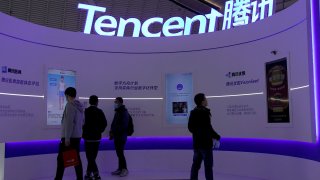
- Shares of Tencent and NetEase plunged on Tuesday after Chinese state media branded online gaming "opium."
- The article also called for further restrictions on the industry in order to prevent addiction and other negative impacts on children.
- The article, by Economic Information Daily, a Chinese state-run publication, said online gaming addiction among children is "widespread" and could negatively impact their growth. It was deleted a few hours after publication.
GUANGZHOU, China — Shares of Tencent and NetEase plunged on Tuesday after Chinese state media branded online gaming "opium" and likened it to a drug.
The article also called for further restrictions on the industry in order to prevent addiction and other negative impacts on children.
The article was deleted a few hours after publication but has since been re-published with a new headline and references to "opium" removed.
Get Southern California news, weather forecasts and entertainment stories to your inbox. Sign up for NBC LA newsletters.
Tencent shares closed around 6% lower, while NetEase closed down almost 8% in Hong Kong, with both companies clawing back some earlier losses. Tencent is one of the world's largest gaming companies responsible for high-profile games like "Honor of Kings."
NetEase declined to comment. Tencent was not immediately available for comment.
The article, by Economic Information Daily, a Chinese state-run publication that's affiliated to the official Xinhua newspaper, said that online gaming addiction among children is "widespread" and could negatively impact their growth.
Money Report
The article said that in 2020, more than half China's children were nearsighted and online games affects their education.
The sentiment in the article is not that new. For a long time, the Chinese government has been concerned about the impact of video games on minors.
In 2018, Beijing froze new game approvals over concerns that gaming was impacting youngsters' eyesight. In China, online games require approvals from the regulators.
In 2019, China brought in rules that banned those under 18 years from playing online games between 10 p.m. and 8 a.m. and restricted the amount of time they could play.
"The article brought attention to gaming addiction among minors. It is reminiscent of older articles where video games were compared to digital heroin," said Daniel Ahmad, senior analyst at Niko Partners.
"The timing of the article has raised concern among investors given the recent crackdown on tech companies and the education/tutoring sector."
Tencent announces new measures
The article also called for more control over the amount of time children are playing games for and review content of games more stringently to reduce the amount of "improper" information shown to minors.
"For the next step, there should be stricter controls over the amount of time minors play online games. It should be reduced by large amount from current level," the article said, according to a CNBC translation.
Both NetEase and Tencent have introduced measures to protect young players including real-name registrations to play games. Last month, Tencent introduced a facial recognition feature on smartphones to verify that the gamer is an adult.
But after the publication of the article on Tuesday, Tencent announced further gaming restrictions
It will reduce the amount of time those under 18 years old can play the company's games on non-holiday days from 90 minutes to one hour and on holidays from 3 hours to 2 hours.
Tencent will also bar children under 12 years old from spending money in the game.
The gaming giant said it will also crack down on identity fraud to find minors who are using adults' accounts to play games. These new measures will begin with Tencent's "Honor of Kings" game and eventually roll out to other titles.
Tencent also called for the whole industry to discuss the feasibility of banning gaming for children under 12.
Ahmad noted that most revenue in China is generated by players who are 18 years old and above.
"If more measures come into place to prevent youth addiction to gaming, it won't stop revenue generating gamers from playing," Ahmad said.






